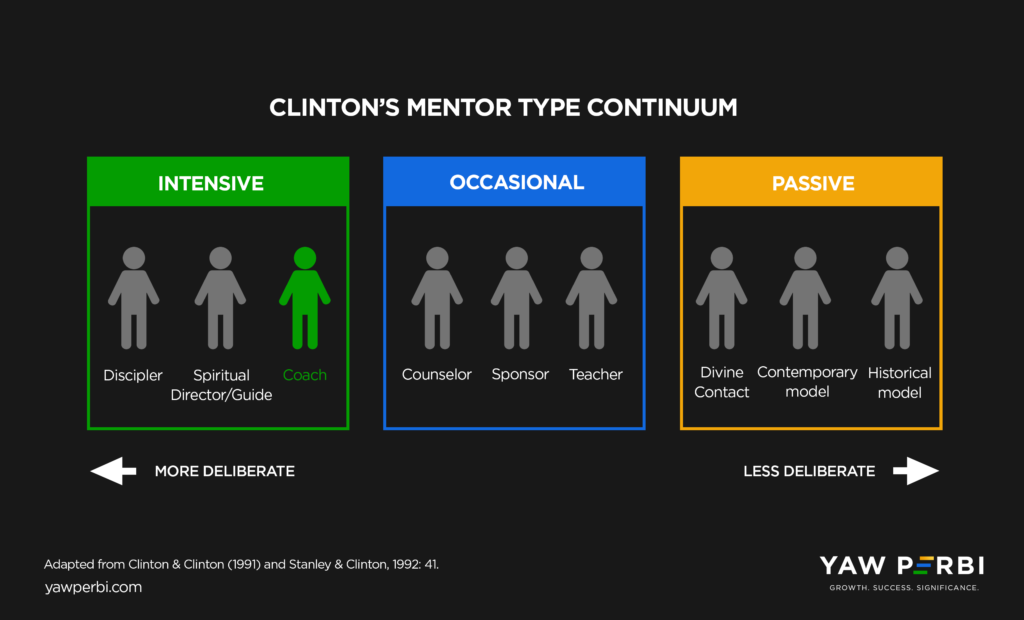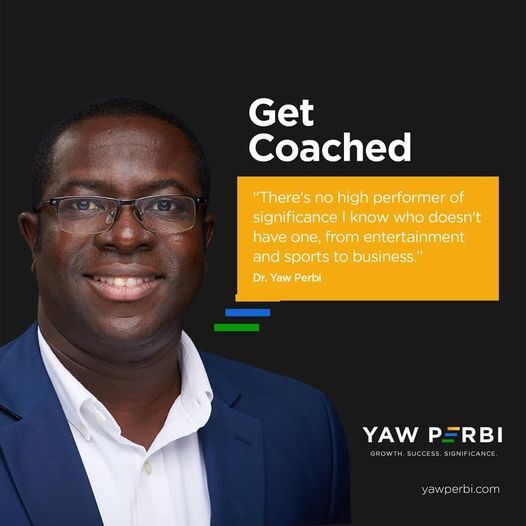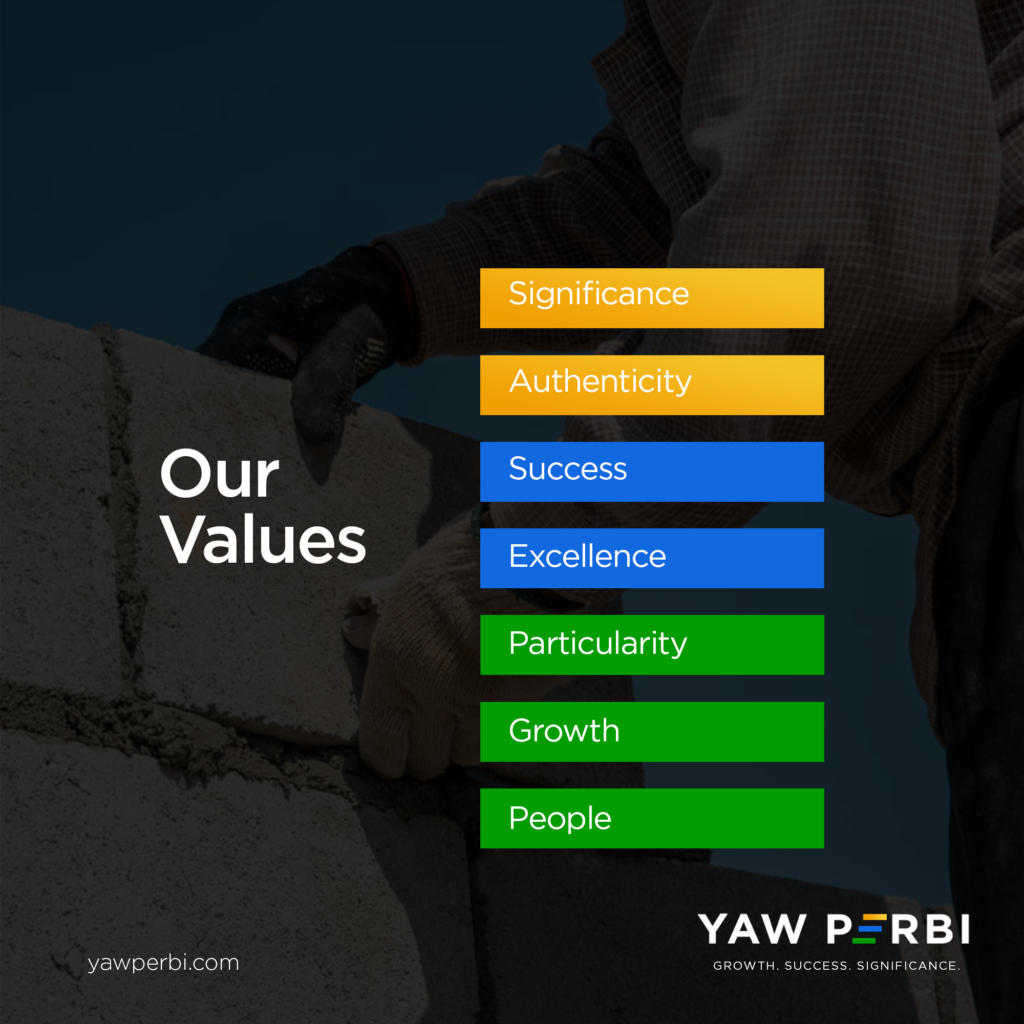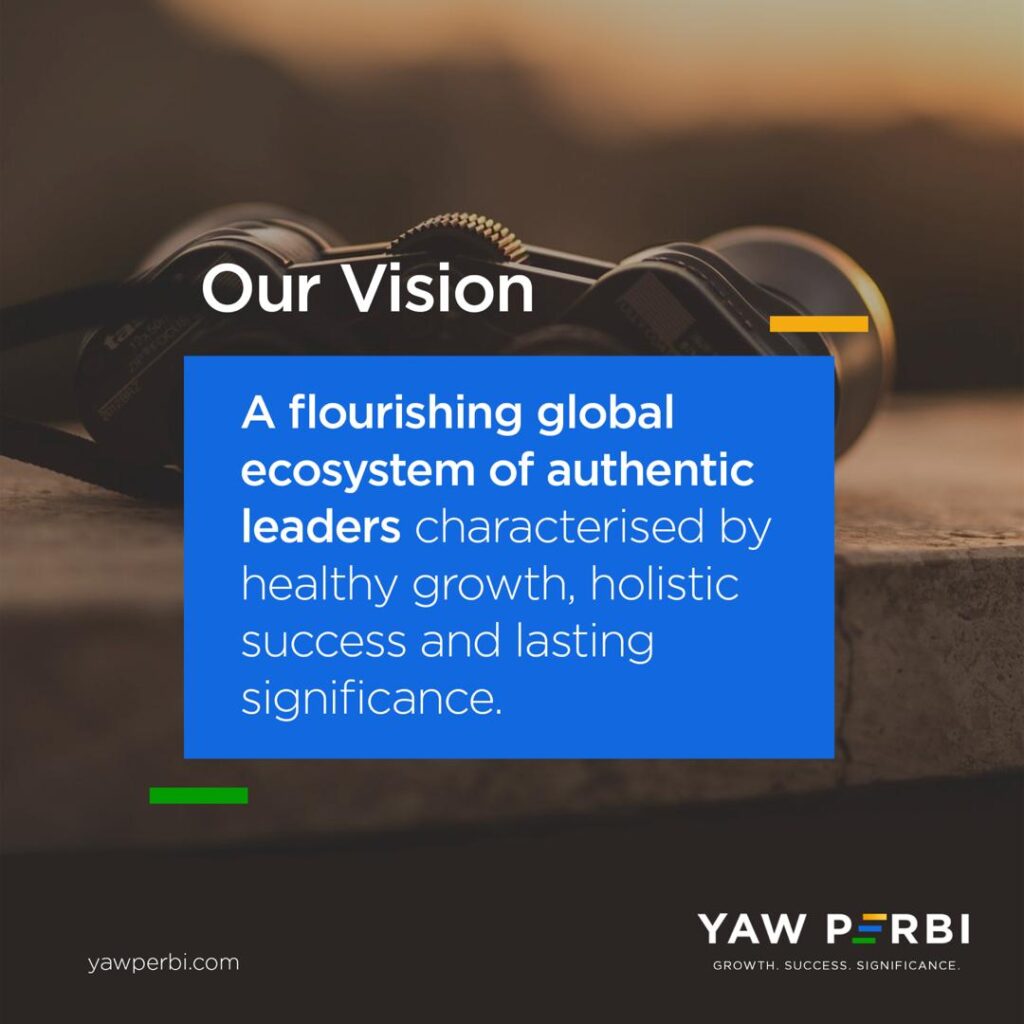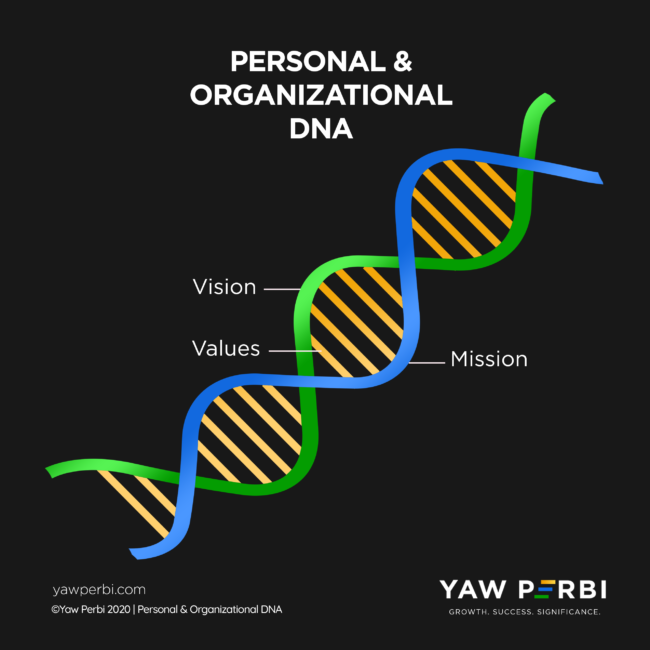
Personal and Corporate DNA: Vision, Mission and Values
Your vision, mission and values constitute your DNA, personal and corporate. Here’s why and how.

Vision, mission and values are really the life-giving and life-forming essence of persons and organizations
Whether one-on-one executive coaching or one-on-few, an exercise that energizes me most is getting into personal/corporate vision, mission and values. Once, I was invited to be a keynote speaker at an organization whose founder and CEO I greatly admire and respect. After the plane ride and having rested up, I got to their premises and looked round their impressive corporate building (no mortgage; all already paid for). I couldn’t help noticing the huge murals that spelt out the organization’s vision and mission. They were literally bill boards all over the walls trying to spell out why they existed and what they sort to accomplish.
Then I began to be concerned as what had been stated as their vision looked like what should be the mission and the mission was… well, let’s just say I was concerned. How was I to bring this up to the ‘big man’ without offending him too much, especially knowing how vital vision, mission and values are in giving life and forming persons and organizations? Without a deep and urgent intervention regarding the writings on the wall, I was afraid the writing was on the wall.
SOME CORPORATE SCIENCE
Permit the doctor in me to explain some fundamentals about DNA. DNA is the material that carries all the information about how a living thing will look and function. Each piece of information is carried on a different section of the DNA. These sections are called genes. DNA is short for deoxyribonucleic acid. It is in every cell of every living thing, even your fingernails! DNA is tiny but consequential; scientists need to use very powerful microscopes to see them. DNA has a complex structure but basically looks like a ladder that is twisted into a spiral. Each piece of DNA has two long strands (like the sides of a ladder). The two strands are joined together by chemical bases that form the rungs of the ladder.
Person and organizations are living things also. Vision, mission and values are the stuff that carry all the information about how they will look and function, survive and thrive. Vision and mission are akin to the two helical strands of DNA and values are the pieces that hold both sides together like the rungs of a ladder. This is the biochemistry of corporations.
Do you know that what determines how you look (eg. colour and texture of your hair, colour of your eyes and skin), how your lungs work, your blood type etc. are all determined by DNA? There are about 3 billion pairs of the chemical bases on the strands that connect with the other strand. The order in which the bases are arranged is very important. It forms a code that tells cells to make certain kinds of proteins. The differences in these proteins is what makes different living things—such as a plant, a panther, and two different people—different. You and I are different as persons, so are Unilever and Microsoft, or F.C. Barcelona and Manchester United, based on DNAs. Arsenal’s DNA codes for redness and Chelsea’s for blueness.
When DNA works correctly, it helps keep the body functioning properly. DNA helps cells to make proteins, which the cells need to live. DNA also allows living things to reproduce. The genes in DNA pass along physical traits from parents to children. Sometimes there are mistakes in DNA. These mistakes are called mutations. They can cause diseases and other problems.
INTERVENTION
Here are two disturbing observations I’ve made regarding vision, mission and values. One is the peer pressure of having them because just because ‘everyone else does’ and it’s in vogue. This pressure to look good because you have a mission statement on your office wall has gone even to the extent that people even look at those of companies or persons they admire and just blindly copy them as their own! Imagine my body copying your body’s DNA! The other disturbing observation is that people have no idea which is which (particularly vision and mission) and have them all over the place! If you need personal or corporate coaching to get this right, please do! This is vital. Vision, mission and values are really the life-giving, life-forming and life-replicating essence of persons and organizations.
VISION & MISSION
Vision is literally what we want to SEE. It is about Being. Think of it as a noun. Mission is what we want to DO to see what we want to see. It is about Doing. Think of it as a verb.
So for example, my vision for this executive education company YAW PERBI is to see a flourishing global ecosystem of authentic leaders characterized by healthy growth, holistic success and lasting significance. Consequently, our mission is to offer authentic and customized relationships and resources to C-level executives to grow personally, succeed professionally and become significant corporately.
Another family company that is into library services for children is known as Perbi Cubs. That company has a different DNA from YAW PERBI, though both entities bear the name Perbi and have some things in common. The DNA of Perbi Cubs is different because its vision, mission and values are different. The vision of Perbi Cubs is to see EVERY African family successful as a product of an enlightening culture of leisure reading. And what are they doing to see what they want to see a.k.a mission? To deliver an evidence-based, literacy-promoting endeavour to an engaged community of families hungry to know more so they can be more, do better and succeed.
Yet another family business, Trenor Coats & Gowns Ltd., has had a vision since its founding in 2009 to be a leader in the textiles care industry in West Africa. The mission is to provide customers with world-class textile care services driven by state-of-the-art facilities, trained and dedicated employees, and superior customer services.
By now you’ve had enough to chew on regarding the double DNA helix of vision and mission. I’ll save the rungs of the DNA, values, for a later blog.
AT THE END OF THE DAY
Individuals and organizations ought to make the time to clearly hone out their clear vision, passionate mission and compelling values. This is a fundamental function of leadership. The help of a coach or consultant is highly recommended. It must be done right. I strongly advise individuals to make sure that their personal DNA aligns with the corporate DNA of whatever organization they work for/with (or seek to work for/with). DNA is life. No DNA, no life; bad DNA, bad life–be it personal or corporate. Choose life!
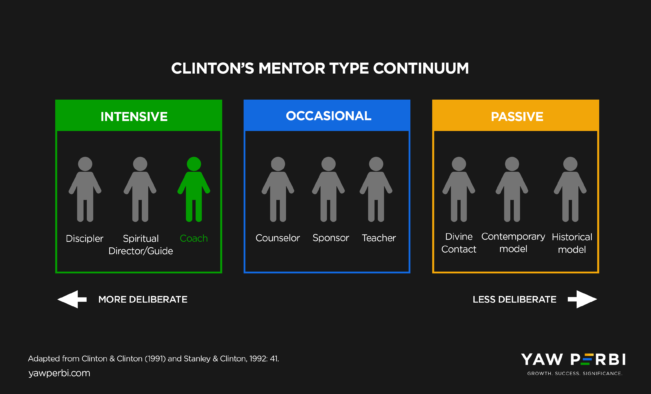
GET COACHED | What’s that?
There is no significant high performer I know who doesn’t have a coach, from entertainment and sports to business. Some have even more than one. How about you?
It was just a one-hour call with a coach. Let’s call him Joe. It changed the trajectory of my life. It wasn’t at a corner office in downtown Montreal or in one of the new plush buildings decorating the Accra skyline. It was at home, just at home; over Zoom. But utilizing the major tool coaches employ–questions, questions and more questions–the lightbulb suddenly came on and within 24 hours I had the oomph to re-start passive income generating projects I had kept procrastinating for a decade! How much that call with Joe cost me in dollars cannot be compared with the kind of lifetime value I gained and lifelong income stream I am cued to earn. I love the CLARITY coaches help bring to our thinking.
SO WHAT IS COACHING?
One of the most (ab)used words in our time is ‘mentor’ or ‘mentoring’ (or ‘mentorship’). I’ve heard and read people actually say coaching and mentoring are two different things. But no, mentoring is a term for the broader framework of empowering relationships every successful person needs (see diagram above) and coaching is a form of mentoring.
According to one of my leadership professors (during my Master of Arts in Global Leadership), mentoring is “a relational process in which a mentor, who knows or has experienced something, transfers that something (resources of wisdom, information, experience, confidence, insight, relationships, status etc.) to a mentoree, at an appropriate time and manner, so that it facilitates development or empowerment” (Clinton & Stanley 1992, 40). Mentoring is relationship, relationship, relationship. A relational experience, relational process, relational exchange.
Coaching, therefore (I repeat), is a form of mentoring, as is each of the other eight types of mentoring shown in the Clinton Continuum diagram above.
WHAT MAKES COACHING DIFFERENT?
First of all, you will notice that coaching is classified among the first third of relationships under ‘INTENSIVE’, unlike counselor, teacher and sponsor (grouped in the middle third) which are OCCASIONAL experiences. For example, as a coach, I recommend at least twice a month meetings with my coachees; sometimes even weekly (depending on their situation, needs and goals) for a minimum of six months. The ideal is a contact every 10 days especially so that no balls are dropped inadvertently.
While the scope of this write-up is not to describe every one of the nine mentoring relationships but to highlight coaching in particular, let me briefly say that a discipler is someone who enables another in the basics of following a religion (especially Christianity), a spiritual guide provides accountability, direction and insight for questions and decisions affecting spirituality and maturity. A coach provides motivation, clarity, challenge, accountability, skills and application needed to meet a goal. Clinton would argue that “the coach’s central thrust is to provide motivation and impart skills and application to meet a task or challenge” (73). Coaching, he would say, “is a process of imparting encouragement and skills to succeed in a task through a relationship” (76).
THE NITTY-GRITTIES
Coaching is an on-going conversation where I (as your coach) provide encouragement, guidance and honest feedback, as YOU pursue YOUR personal and professional goals. I fully expect you to grow yourself and your family/business/organization and succeed in life, by attaining your goals!
There is no significant high performer I know who doesn’t have a coach, from entertainment and sports to business. Without a coach, it is hard for anyone to experience high performance on their own, let alone to achieve what has come to be known as meta performance. In today’s competitive environment, some of the most successful business leaders have experienced tremendous benefits from coaching. Results have included increased revenue and productivity, career advancement, higher employee retention, and the development of more effective business strategies. YOU will define the agenda. YOUR results will vary depending on how long we work together and what actions YOU take.
As a John C. Maxwell trained and certified coach, my clients are expected to, and have experienced, measurable return on investment, increased productivity, and up to 200% revenue growth.
IT WORKS! LET ME HELP YOU.
If I didn’t believe this stuff, I wouldn’t be promoting it. The proof of our belief in anything is our investment of time and money in it. I personally have my own coach who I pay hundred of dollars to for three sessions monthly. At YAW PERBI, our value proposition is authentically empowering C-level executives for exponential growth in 90 days, success within a year and significance for a lifetime (and beyond). Try me. Try us.
We are human, thus limited, and cannot help everybody. Currently I personally have only 10 places each year for authentic, high quality and deep relationship one-on-one coaching so I have had to make the hard decision to focus mainly on C-level executives. The wisdom in that is, as my mentor John Maxwell says about what he calls “the Law of the Lid,” when they get better (raise their lids), everyone else else under them gets better. Knowing how key coaching is, however, no one will ever be turned away. I would be more than happy to refer you to others within my very rich coaching network. Everyone deserves a competent and caring coach.
Apart from one-on-ones, there are times I do one-on-few coaching for a group of executives. My favourite is helping executives work through company DNA (vision, mission & values)! I share about that in a later blog here.
If you’re ready to grow, succeed and be significant, take my hand and let me help you. Let me be your coach.
Bibliography
Clinton, J. Robert and Paul D Stanley. 1992. Connecting: the mentoring relationships you need to succeed in life. Colorado Springs: NavPress.

I’m Serving Up: Here’s How.
Like leadership, there are umpteen definitions of culture. My favourite is the simplest. Culture, whether ethnic or corporate, is simply the way things are done here. How things are seen to be done at YAW PERBI is determined, like Apple or Android, by our unseen Operating System (OS). That OS or worldview feeds our beliefs, informs our values, which in turn determine our behaviour.
As we carry out our vision and mission, here are our 7 YP values and what they mean:
1. People. We value people: People come first; not stuff. People are the only creation that bear the imago Dei (image of God). That should mean something; everything.
a. We are aware that without people we are nothing.
b. We value relationships and foster community.
c. We grow people, clarifying their identity, giving them purpose, unearthing gifts, nourishing persons to flourish.
d. We pride in, promote and protect family.
e. We offer high care to our clientele, with a great deal of empathy.
f. Our exceptional client experience leaves them feeling wonderfully valued.
2. Growth. We value growth: We grow or die. There’s no middle way.
a. We invest in ourselves and invest in others’ growth; continually.
b. We are sworn to lifelong learning in a diverse community till we die.
c. We strive to be knowledgeable and enlightened in order to succeed.
d. We expect pain to be associated with grown and have made peace with the fact.
3. Particularity. We value particularity: One size doesn’t fit all. Each client is different and has a unique life story and makeup.
a. We see and treat each person reverently, as wonderfully made.
b. We invest in getting to know our clients’ life stories, identity, purpose, and SHAPE.
c. We honour the above (a & b) by customizing our offerings.
d. We provide tools to discover and affirm uniqueness of each client and match them to the appropriate relationships and resources.
e. We pride in and promote the prestige of the executive class.
4. Excellence. We value excellence: We go above and beyond.
a. We exceed expectations as a habit.
b. We work hard and play hard.
c. We take our word and commitments seriously.
d. We do not compromise on quality–it is a virtue.
e. We do anything that is worth doing, well.
5. Success. We value success: We are passionate about all-round prosperity.
a. We are committed to the progressive realization of worthy goals and ideals; our clients’ goals are ours.
b. We inspire and motivate ourselves and our clientele to see and seize their dreams.
c. We long for holistic success.
d. We are victory connoisseurs.
6. Authenticity. We value authenticity: No fake folks or fake news, no fake products or services.
a. We lead, coach, author, speak and train with integrity.
b. We are truthful about ourselves and our offerings.
c. We can be trusted.
d. Our ways and means are proven to produce desired results. What we promote works.
e. We are in public who we are in private.
f. We are holistic in thinking and living, in our being and doing.
g. We strive to live and lead such that those who know us and love us the best (family and friends) respect us the most.
7. Significance. We value significance: We live to ‘make a dent in the universe’.
a. We look outward, beyond ourselves.
b. We work towards things that benefit communities, nations and generations.
c. We are inspired by the thought that our best works will outlive us.
d. We bear in mind that only what is done for God’s glory by God’s grace will last.
WHAT’S COOKING & HOW WE’RE SERVING
So now, you don’t only know our menu–the vision and mission–you also know the manner in which we plan to dish it all out. I’m serving up. Take a seat.
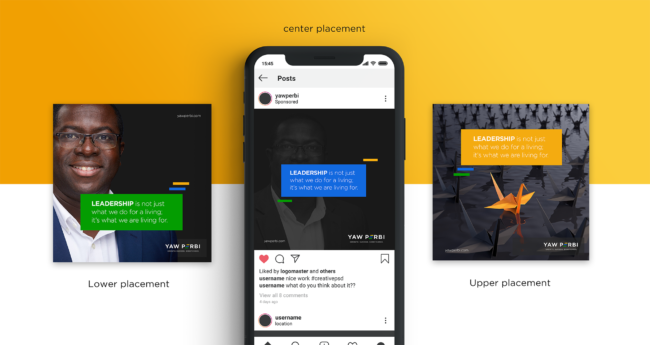
I’m Stepping Down
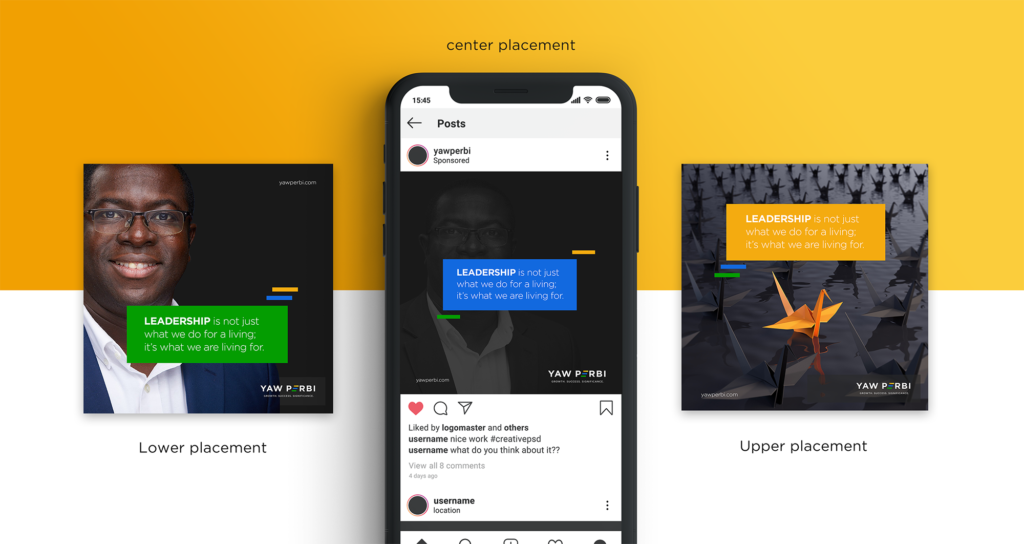
My brand is all about authentic leadership; leading well and helping others do so too. That’s my raison d’être.
So! This is a sequel to my previous I’m Coming Out blog. In that, I copiously explained how, “Prominent among the treasures of this pandemic cum sabbatical year has been the realization that it’s about time I did less of the work of leading corporations and charities and rather focus on raising world class leaders among C-level executives who will go on to lead many good things and many great people.” D.L. Moody once said, “It is better to train 10 men than do the work of 10 men. But it is harder.” He was right.
I am serious enough about this new direction that I’m stepping down as President of ISMCanada with effect from June 2021, Deo volente. When I agreed to this role in March 2013, and officially began in May of that year, my initial arrangement with the Board was a 3-5 year tenure. It’s been almost eight years now! I’ve done double duty. Among other things, I’m happy to have worked with an overhauled senior leadership team to steer the organization to become a Certified Best Christian Workplace, a flourishing organization.
In coming out and stepping down, I’m happy to catalyse, consult for and coach CEOs and other C-level executives in both the marketplace and ministry, as well as continue my speaking/training career which has taken me to some 45 countries of the world. As we launch the YAW PERBI brand, I would like to share our vision, mission, values, unique selling disposition and offerings with you.
VISION
At YAW PERBI, we want to see a flourishing global ecosystem of authentic leaders characterised by healthy growth, holistic success and lasting significance.
MISSION
Our mission, therefore, is to offer authentic and customized relationships and resources to C-level executives to grow personally, succeed professionally and become significant corporately.
YP VALUES
As we go about our vision and mission, our corporate behaviour will be based on the following seven things that are very important to us. We value:
- People
- Authenticity
- Particularity
- Excellence
- Growth
- Success
- Significance
In another blog I go into the fine details of what each value means and how they play out at our company.
UNIQUE SELLING PROPOSITION
We know there are a myriad leadership development and executive coaching companies out there. Our bold value proposition is authentically empowering C-level executives for exponential growth in 90 days, success within a year and significance for a lifetime (and beyond).
OFFERINGS
What exactly are we offering in terms of products and services? We like to say we LIFECAST, an acronym for providing Leadership, Integrity, Family and Entrepreneurship Coaching Authoring Speaking and Training. LIFE is our content focus and CAST comprises the vehicles for delivering the LIFE. By the way, apart from the ‘C’ standing mainly for executive Coaching, it also often involves Catalyzing and Consulting. Authoring encompasses soft and hard products from (e-)books to courses.
The YAW PERBI brand communicates prestige and authenticity, success and significance.
CONCLUSION | CLARITY, NOT CERTAINTY
Even in clearly laying out our vision, mission, values, unique selling proposition and offerings at YAW PERBI, this is not only introducing you to my new brand but inherently providing a lesson for executives, many of whom haven’t clearly laid these things out for the corporations, charities and churches they lead. Even in an uncertain year like 2020, as John Maxwell my mentor says, “Individuals can live without certainty from a leader, but not without clarity. …Your people do not need certainty on every issue; but they do need clarity on every issue.”
I’m out. I’m stepping down. I’ve told you why, when and how. Not everything is certain; but am I clear?
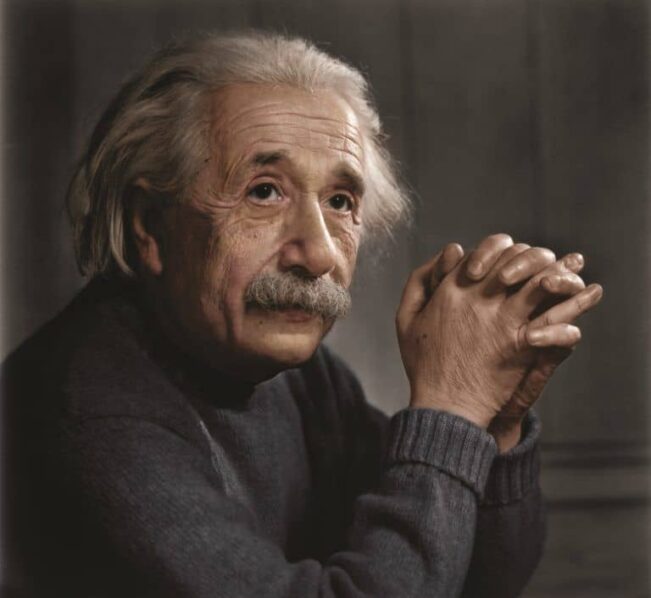
Disrespecting Einstein | A note to HR bosses

Nobel Prize Laureate Albert Einstein (14 March 1879 – 18 April 1955) Photo credit: Perimeter Institute
Exactly a week ago, I finished two days of consulting for a flourishing company in Accra that was making two new hires. It wasn’t the first time I was coaching them through the hiring process and chairing the interview panel but this time there was an HR consultant who was excellent in putting everything together, literally setting the table for us all. Meticulous chap who knows his stuff! Because of a five-hour time difference between Montreal (where I’m currently based) and Accra, the 9.30am interview start on Zoom meant 4.30am for me. Well, whatever!
Everyone interviewed was a young, hope-filled university graduate, some as freshly minted as last year. I could tell the hope in their hearts and could see the fire in their eyes to ‘make it,’ here first and in the rest of life, of course! And in fact, they weren’t asking for too much. As usual, not everyone made it. Out of eight interviewees (and this was after whittling down several applications and getting the short-listed ones to fill out pre-interview questionnaires) we had room for just two.
POST MORTEM
Now here’s the kicker: the HR consultant’s drafted letter to this group who couldn’t be hired went like this:
Dear Candidate, many thanks for your patience and continuous interest in the role of __________ at __________. After thorough consideration, we are sorry to inform you that you were not successful. We take this opportunity to wish you well in all your future endeavours.
No. I couldn’t let that pass–precisely because of that phrase have made bold above for emphasis. Words matter. So I asked him, politely, if we could put “you were not successful” in a different way, in a more positive manner? Eg. “Another candidate was preferred?” And that is what we did.
Even the CEO was touched by this. She responded, “Thanks so much for the feed back Dr Perbi. True. We are working with real people’s emotions and lives.” She then went on to recount something I had done in a previous search for a C-level executive for the same company. She wrote, “ I remember the special messages you sent to each one of the candidates who did not make it, accompanied by a summary of their performance [so they could improve, work on themselves] and a prayer for them during the previous selection process. I was touched and l believe most of them appreciated the gesture.” Indeed they had felt so valued and encouraged, some wrote back to say thank you! It almost didn’t matter that they had not been picked for the role. With that buoyancy, I bet they went on to be and do great things elsewhere.
DISRESPECTING EINSTEN
From time immemorial leaders have misjudged the capabilities and potentials of others; sometimes in an outrightly comical fashion (only on hindsight, of course!) When in 1898 Albert Einstein applied for admittance to the Munich Technical Institute he was rejected because (read this slowly) he would “never amount to much.” Consequently, instead of going to school he went to find work at the Swiss Patent Office where he was employed as an inspector and with his extra time, refined his theory of relativity. As they say, the rest is history.
MY POINT?
Ask yourself: how would I act differently if I knew for sure this was an Einstein sitting in front of me? People are not just human ‘resources’, like cogs in a wheel. They are human beings. They have emotions, identity and purpose. Each bears the imago Dei (the image of God) and in the phraseology of Büber, must be treated as a ‘Thou’; not an ‘It.’ If for nothing at all, in respect for their Creator and in honour of their boldness to apply, to step into the ring, to do something with their lives. You certainly don’t want to meet them somewhere else in life and be ashamed of what you thought of them, how you spoke to them or handled them. They might even be in a position to hire or fire you someday. You may very well be disrespecting Einstein.

